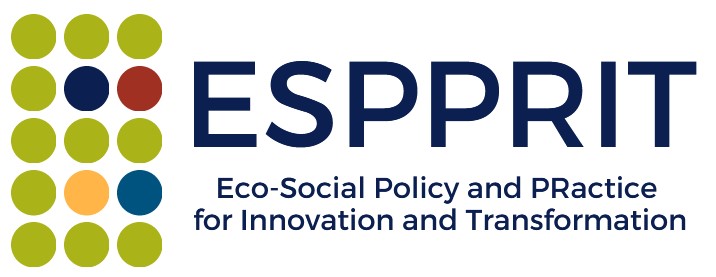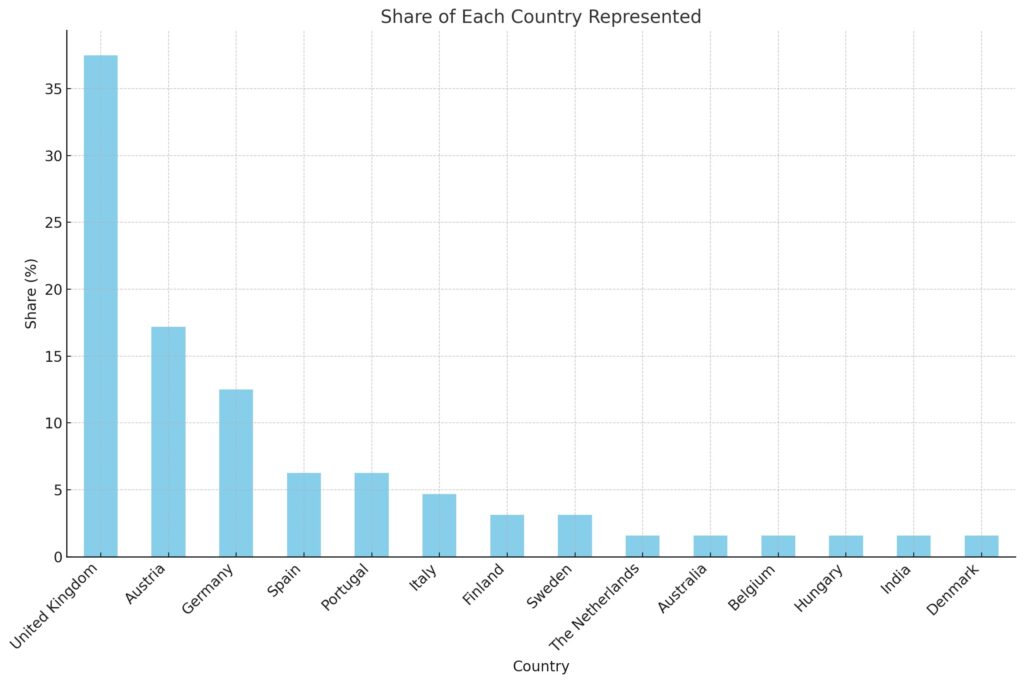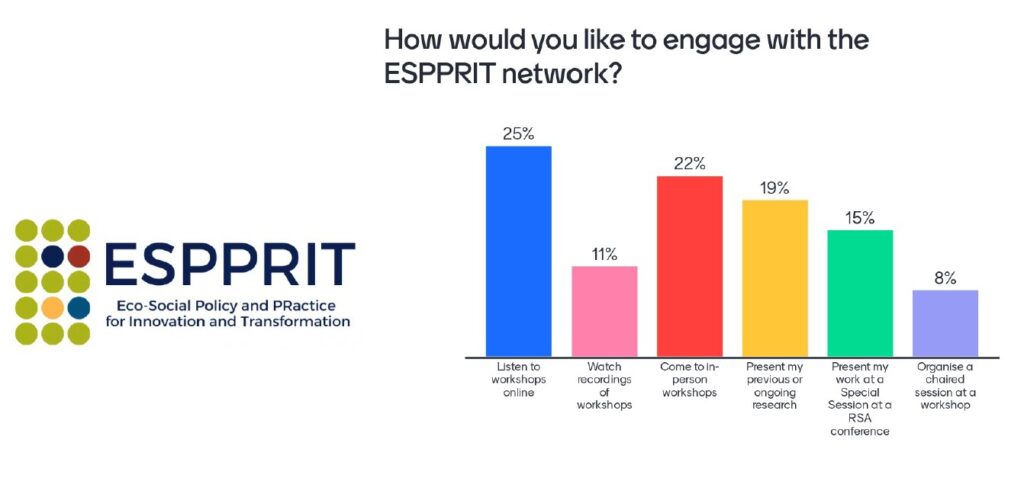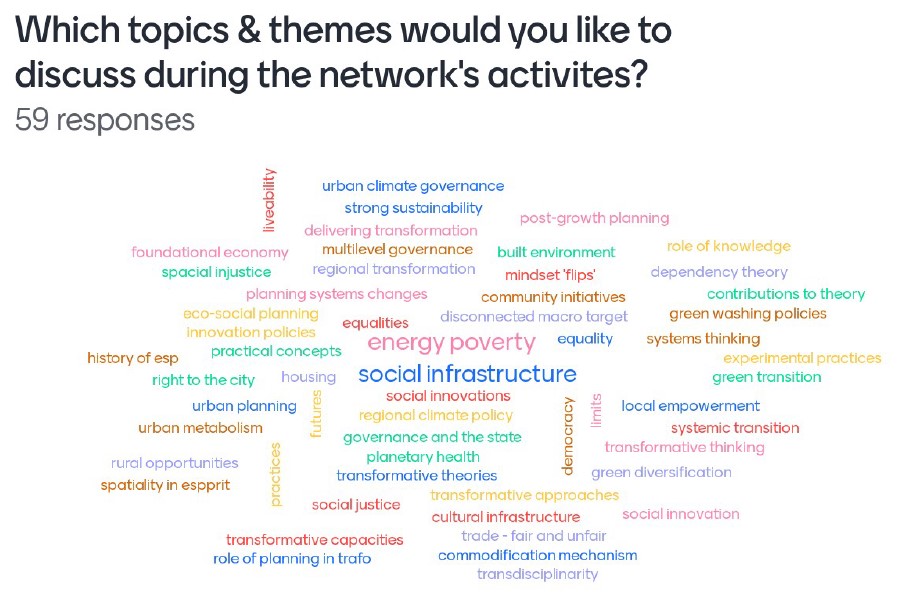By Astrid Krisch (email), Postdoctoral Research Fellow, Global Centre on Healthcare and Urbanisation, University of Oxford, Lucas Barning, TU Wien, Research Unit of Sociology, Institute for Spatial Planning, Sarah Ware, WU Wien and Alexander Hamedinger, TU Wien, Research Unit of Sociology, Institute for Spatial Planning.
Introduction
On May 28, 2024, the RSA Research Network on Eco-Social Policy and Practice for Innovation and Transformation (ESPPRIT) convened its first event. The workshop aimed to kick off the networks’ activities for the coming years, inviting scholars from different disciplines to engage with the theme of eco-social transformations from their perspectives. The network aims to foster interdisciplinary discussions on approaching eco-social transformations by involving a wide range of participants with expertise. Our point of departure is the concern that climate change, directly and indirectly, affects our social world and comes with increasing social and spatial inequalities (Gough 2017, Drupp 2021), while our social welfare system and policies on various levels often undermine climate protection efforts (Bohnenberger 2023, Hilvilammi et al. 2023). This necessitates thinking about both ecological and social concerns together when initiating, designing and implementing transformative change (Skjølsvold and Coenen 2021, Avelino et al. 2024). ESPPRIT wants to bring these debates into conversation with each other, engaging with the question of eco-social transformation by bridging understandings on where to begin and which level, approach, strategy or concepts are most useful for transformative change.

The network has four objectives:
- To better understand the geographical dimension of eco-social transformation through addressing questions of how geography can help us understand varieties and commonalities in alternative development approaches, including post-growth, the foundational economy, sustainability transitions and sustainable welfare.
- To shape a just eco-social transformation, linking to debates on uneven development and how social innovation and eco-social policies can address this challenge.
- To foster interdisciplinary discussions, learn from different approaches, and better understand the trade-offs between them.
- To showcase conceptual, methodological, and empirical work from past or ongoing research or ideas for future projects on eco-social transformation.
Engaging different disciplines in eco-social transformations
The network organisers convened the event to kick-start the discussion on eco-social transformation from different perspectives. They invited participants and speakers to reflect on their understanding of eco-social transformation and how to bridge different approaches and levels of action. The event was attended by 73 people from 14 countries and three continents (see Figure 1).
Figure 1: Number of attendees by country of institution (Source by the authors).

To launch the discussion, we invited two speakers from the network to present their views on eco-social transformation and how to synchronise different levels and approaches to inspire the discussion with the audience:
- Kevin Morgan, Professor of governance and development at the School of Geography and Planning, Cardiff University, was invited to share his expertise on innovation and spatial development, food policy and innovation, sustainability and public procurement, devolution, governance and territorial politics, and the foundational economy, community enterprise and wellbeing. Kevin’s research has been supported by a wide range of sponsors, including the ESRC, the British Academy, the European Commission, OECD, and by governments and development agencies in and beyond the UK. Some of his recent publications include mundane innovation in the periphery, the foundational economy in less-developed regions, governing industrial policy, the scope and limits of the food governance agenda, and why mundane things matter, from moral economy to foundational economy.
- Tuuli Hirvilammi, Senior Research Fellow at the Faculty of Social Science at the University of Tampere, Finland, was invited to reflect on her background in social policy coming from a broad transdisciplinary orientation. Her research investigates questions of how ecological crises and sustainability transformations are connected to human wellbeing and welfare states with specific research interests in sustainable wellbeing, eco-welfare state, eco-social policies, welfare theories, degrowth and ecological economics. Tuuli is currently involved in several projects studying the transformation towards an eco-welfare state and integrated policies and transformative indicators for a sustainable wellbeing economy. Her recent publications include pillars of just transition labour market policies, enabling factors for transformative eco-social initiatives, and social policy in a climate emergency context towards an eco-social research agenda.
Building momentum for eco-social transformations
The workshop started with an introduction from the networks’ organisers on the debates on which the network theme is built. We understand eco-social transformation as the combination of ecological and social goals for deep-seated fundamental change as opposed to incremental change (Suitner et al. 2022, Weller and Beer 2022). This necessitates thinking about changes in social practices and systemic structures. Thus, we build on debates around social innovation, looking at how innovations can change social interactions, practices, and configurations “from below” (Avelino et al. 2019, Pel et al. 2023, Marques et al. 2018, Suitner et al. 2024), and sustainable welfare and eco-social policies, looking at how welfare states and social and climate policy can more effectively address both social and ecological risks “from above” (Bohnenberger 2023, Büchs 2021, Mandelli 2022). Bringing these debates together offers useful concepts and considerations for eco-social transformation.
Our speakers were then invited to give a 10-minute input, sharing their understanding of eco-social transformations and how their previous and ongoing research has engaged with this topic. Kevin highlighted the importance of diverse and pluralistic conceptual frameworks in eco-social innovations. He cautioned that there is no one best way to approach eco-social innovation and policy, and instead argued for a pluralistic and diverse approach to eco-social transformation. As such, he emphasised the foundational economy framework, which focuses on essential sectors including food, water, energy, housing, health, and elder care. These sectors are crucial for meeting everyday human needs but also face significant ecological challenges. Kevin built the link to related concepts, such as universal basic services, as a similar approach using different terminologies and emphasised focusing on the substance rather than the labels. Crucially though, these sectors must be decarbonised in a socially just way as they are meeting human needs but are often also a major contributor in terms of their carbon footprints. Kevin took the example of social innovations in public food systems, particularly in schools, hospitals, care facilities, and prisons to highlight two major trends in school reform: the push for universal free school meals and the transition to plant-based diets, emphasising the importance to address vulnerabilities of the populations served and to counter the impacts of neoliberalism on public sector capacity and resources.
Kevin outlined several challenges in implementing eco-social policies effectively, including the underutilised potential of public procurement, lack of political leadership and low professional status of procurement roles. He argued for the integration of procurement with production and consumption policies for systemic food system reform. Another key challenge is the spatial mismatch in policy implementation for local levels, which tend to have the most direct impact on daily life, but often the least power. Kevin called for embracing subsidiarity to empower cities, regions, and municipalities to initiate eco-social experiments and stressed the need for disseminating and scaling local practices to achieve national traction and transformative change.
In her talk, Tuuli emphasised the critical need for scholars from various disciplines to come together and form networks to address the climate emergency and planetary crises, integrating ecological sustainability and social policy. She is linked to a network of researchers from public policy, social policy, social work, sustainability science, and environmental science to foster collaboration and accelerate transformation, building links between ESPPRIT and already existing networks to broaden the scope of action. Tuuli discussed the concept of eco-social policies, which involves integrating ecological and social dimensions. This integration, as she highlighted, can happen in two ways: adding ecological considerations to existing social policies (e.g., greening welfare stated by promoting sustainable school meals) and adding social considerations to environmental policies (e.g., making energy taxation socially just). The goal is to create policies that simultaneously address ecological sustainability and social equity, avoiding the need for separate countervailing social policies.
Tuuli then shared insights from a study on eco-social initiatives in Finland, identifying four key factors contributing to successful innovations: 1) fostering social networks and collaboration, providing peer support and a sense of belonging; 2) offering knowledge, learning opportunities, and tools for monitoring progress; 3) establishing shared policy frameworks and visions that provide legitimacy and support for transformative actions, and 4) ensuring sufficient financial resources to support long-term transformation and network establishment. She argued that enhancing transformative capacity at systemic levels (state, regional, or local) is crucial for the success of eco-social policies and innovations.
Synergising different approaches to eco-social transformation
Following the two inputs by our speakers, they were then asked to reflect on how to synergise and synchronise different levels and approaches to achieve an eco-social transformation. Three reflections stood out:
- Integrating policy and practice across levels: Both speakers emphasised the need to synchronise eco-social policies at different levels, from local municipalities to national governments and international alliances. Good practices and innovative initiatives can help better understand policies’ impacts at the local level. However, they must be leveraged on larger scales to achieve transformative impact transcending context-specific scales. This requires building networks of innovation and dissemination to ensure that effective local practices are recognised and adopted more broadly.
- Collaborating in academia and policymaking: Collaboration among researchers and policymakers is essential to synchronise efforts towards eco-social transformation. Both speakers discussed the tendency in academia to compete over innovations, interpretive sovereignty over conceptual frameworks and research outputs which can lead to communicating incoherent narratives to policymakers. Instead, collaborative efforts are needed to merge research findings and indicators and present coherent, understandable, actionable and policy-relevant research outputs.
- Building alliances and addressing political challenges: Alliances are also needed between different social groups. Addressing the political dimension more explicitly in eco-social transformations could better aid understanding concerns of environmental sustainability and social stability. The speakers emphasised windows of opportunity through paying more attention to politics and actors leveraging transformative change (Wirth et al. 2023). Overcoming the backlash against sustainability agendas and societal divides needs coalitions that address both ecological and social concerns. This must necessarily involve engaging with and gaining the support of those who may initially resist eco-social policies due to perceived economic or existential threats.
Future avenues in research, policy and practice for eco-social transformations
Following the keynote speakers’ reflections, the audience was invited to comment on the debate and raise questions for discussing them with the network. From the active engagement between the audience, keynote speakers and network organisers, three main themes emerged that reflect the complexity of achieving eco-social transformation and that will be more explicitly addressed in future events:
- The role and limitations of progressive localism: While devolution and local innovations have received broad support from within and beyond the ESPPRIT network (Fransham et al. 2022), the discussion highlighted the fragility of local reforms and their need to be embedded in national systems, policies, and regulations to sustain them and to prevent dependence on individual local leaders or initiatives (Morisson and Doussineau 2019). It was highlighted that local politics is not inherently progressive. Rather, opposition to eco-social policies can occur at the local level, where understanding this opposition can provide insights into why fundamental transformations are difficult to achieve. Thus, The network aims to engage more explicitly with pro-growth positions to better understand and address opposing views.
- Political and economic challenges for eco-social transformations: Participants discussed the importance of mobilisation and purchasing power and how it is currently captured by politics, often supporting right wing arguments in how and where the welfare state should intervene. This has been reflected in debates on ‘left behind places’ (Pike et al. 2022) or ‘leading and lagging regions’ (Calafati et al. 2020). The discussion highlighted the importance of articulating and envisioning collective instead of individual provisioning systems around a new kind of social contract to rethink where change can happen. Critical reflections on local governments, which may support growth due to budgetary needs, highlighted multiple challenges that they are confronted with, including ageing societies and declining tax revenues to fund public services, requiring financial system reforms and addressing deep-seated values and mindsets to overcome growth dependency.
- Strategies for effective eco-social transformation: The debate then moved on to how to bring people together across scales, develop shared visions, and developing tools and strategies, including foresight and futures thinking, the role of the built environment in shaping practices and norms, and deliberative democracy in advocating for tangible shared visions with the potential to overcome disinformation. This was linked to the role of the ESPPRIT network in creating narratives that are relevant for policy and practice, showing how eco-social policies and innovations can deliver tangible benefits in meeting social and environmental goals, while building networks of local activist movements and community economies to provide meaningful agency.
Building collaboration on eco-social transformation
The ESPPRIT network will convene annual workshops for the next three years (2024-2027) to build collaborations and further strengthen the network of interdisciplinary scholarship on eco-social transformation. During our first workshop, participants were asked to indicate how they would like to engage with the network for the coming years (see Figure 2) and the topics they would like to discuss going forward (see Figure 3). Results indicate a balanced view of modes of engagement, which serves as a guideline for the networks’ organisers to plan future events accordingly. In-person events will be held twice a year in different formats with streamed and recorded keynote speeches, with hybrid components integrated wherever possible to accommodate online participation.
Figure 2: Modes of engagement by the networks’ participants.

Figure 3: Possible topics to explore during ESPPRIT.

Future activities
Next events of ESPPRIT include:
- A Special Session at the RSA Winter Conference in London in November 2024 on the topic of “Promoting justice for eco-social transformations in urban and regional development: perspectives from theory and practice”;
- An in-person workshop in Oxford, UK in June 2025 on the topic of “The geography of alternative development policy and practice for eco-social transformation”;
- An in-person workshop in Vienna, AT in October 2025 on the topic of “Learning from social innovation and social policy for eco-social transformation”;
- A Special Session at the RSA Annual Conference in June 2026 on the topic of “Progressing theories and methodologies for eco-social transformations”; and
- An in-person workshop in Amsterdam, NL in October 2026 on the topic of “Research, policy, and practice for regional futures: Shaping and designing eco-social transformation”.
Each in-person workshop will take place over a day and a half with keynote presentations, group discussions and site visits at each location, allowing time for participants to get to know each other and discuss common research interests and future research directions in both structured and informal settings. ESPPRIT will produce event reports and follow-up emails for the participants after each workshop, summarising key debates during the event and highlighting activities for upcoming engagement. Over the network’s lifetime, we will encourage scholarly debates through joint publications and policy- and practice-relevant outreach through different formats in coordination with the networks’ participants. At the end of the ESPPRIT Research Network, we aim to summarise the discussions through publishing a joint paper, conceptualising and outlining debates on eco-social transformations, discussing the geographical dimensions of alternative development policy and practice and the role of space and place for eco-social transformation.
Authors’ biographies
- Astrid Krisch, Dr, University of Oxford, Global Centre on Healthcare and Urbanisation. Research interests: urban and regional studies and planning, governance of eco-social transformations, sustainable wellbeing, social innovations
- Lucas Barning, MSc, TU Wien, Research Unit of Sociology, Institute for Spatial Planning. Research interests: Energy transitions, infrastructure governance, social theory, justice and power relations.
- Sarah Ware, MSc, WU Wien, Institute for Multi-level Governance. Research Interests: urban environmental planning, post-growth and degrowth, social-ecological transformation, participation, and social movements.
- Alexander Hamedinger, Prof, TU Wien, Research Unit of Sociology, Institute for Spatial Planning. Research interests: spatial theories, governance, planning theories, planning policy.
References
Avelino, F., van Steenbergen, F., Schipper, K., et al. (2024). Mapping the diversity & transformative potential of approaches to sustainable just cities. Urban Transformations, 6(1), 1–29.
Avelino, F., Wittmayer, J. M., Pel, B., et al. (2019). Transformative social innovation and (dis)empowerment. Technological Forecasting and Social Change, 145, 195–206.
Bohnenberger, K. (2023). Peaks and gaps in eco-social policy and sustainable welfare: A systematic literature map of the research landscape. European Journal of Social Security, 25(4), 328–346.
Büchs, M. (2021). Sustainable welfare: Independence between growth and welfare has to go both ways. Global Social Policy, 21(2), 323–327.
Calafati, L., Froud, J., Haslam, C., et al. (2021). Diversity in leading and laggard regions: Living standards, residual income and regional policy. Cambridge Journal of Regions, Economy and Society, 14(1), 117–139.
Drupp, M. A., Kornek, U., Meya, J., et al. (2021). Inequality and the Environment: The Economics of a Two-Headed Hydra. SSRN. https://doi.org/10.2139/ssrn.3979352
Fransham, M., Herbertson, M., Pop, M., et al. (2023). Level best? The levelling up agenda and UK regional inequality. Regional Studies, 57(11), 2339–2352.
Gough, I. (Ed.). (2017). Heat, greed and human need. Edward Elgar Publishing.
Harris, C. R., Millman, K. J., van der Walt, S. J., et al. (2020). Array programming with NumPy. Nature, 585(7825), 357–362.
Hirvilammi, T., Peltomaa, J., Pihlajamaa, M., et al. (2023). Towards an eco-welfare state: Enabling factors for transformative eco-social initiatives. European Journal of Social Security. https://doi.org/10.1177/13882627231195724
Hunter, J. D. (2007). Matplotlib: A 2D graphics environment. Computing in Science & Engineering, 9(3), 90–95.
Mandelli, M. (2022). Understanding eco-social policies: A proposed definition and typology. Transfer: European Review of Labour and Research, 28(3), 333–348.
Marques, P., Morgan, K., & Richardson, R. (2018). Social innovation in question: The theoretical and practical implications of a contested concept. Environment and Planning C: Politics and Space, 36(3), 496–512.
Morisson, A., & Doussineau, M. (2019). Regional innovation governance and place-based policies: Design, implementation and implications. Regional Studies, Regional Science, 6(1), 101–116. https://doi.org/10.1080/21681376.2019.1578257
Pel, B., Wittmayer, J. M., Avelino, F., Loorbach, D., & de Geus, T. (2023). How to account for the dark sides of social innovation? Transitions directionality in renewable energy prosumerism. Environmental Innovation and Societal Transitions, 49, 100775. https://doi.org/10.1016/j.eist.2023.100775
Pike, A., Béal, V., Cauchi-Duval, N., Franklin, R., et al. (2023). ‘Left behind places’: A geographical etymology. Regional Studies, 58(6), 1167–1179. https://doi.org/10.1080/00343404.2023.2167972
Skjølsvold, T., & Coenen, L. (2021). Are rapid and inclusive energy and climate transitions oxymorons? Towards principles of responsible acceleration. Energy Research & Social Science, 79, 102164.
Suitner, J., Haider, W., & Philipp, S. (2022). Social innovation for regional energy transition? An agency perspective on transformative change in non-core regions. Regional Studies. https://doi.org/10.1080/00343404.2022.2053096
Suitner, J., Haider, W., & Krisch, A. (2024). Socially innovative experiments for transformative local development: Putting more-than-growth-oriented local interventions in spatial context. Regional Science Policy & Practice, 100035. https://doi.org/10.1016/j.rspp.2024.100035
Weller, S., & Beer, A. (2022). State structures and the limits of agency: Governing the transformation from coal in Australia. Regional Studies, 57(8), 1415–1427. https://doi.org/10.1080/00343404.2022.2047918
Wirth, S., Tschumi, P., Mayer, H., & Bandi Tanner, M. (2023). Change agency in social innovation: An analysis of activities in social innovation processes. Regional Studies, Regional Science, 10(1), 33–51. https://doi.org/10.1080/21681376.2022.2157324



